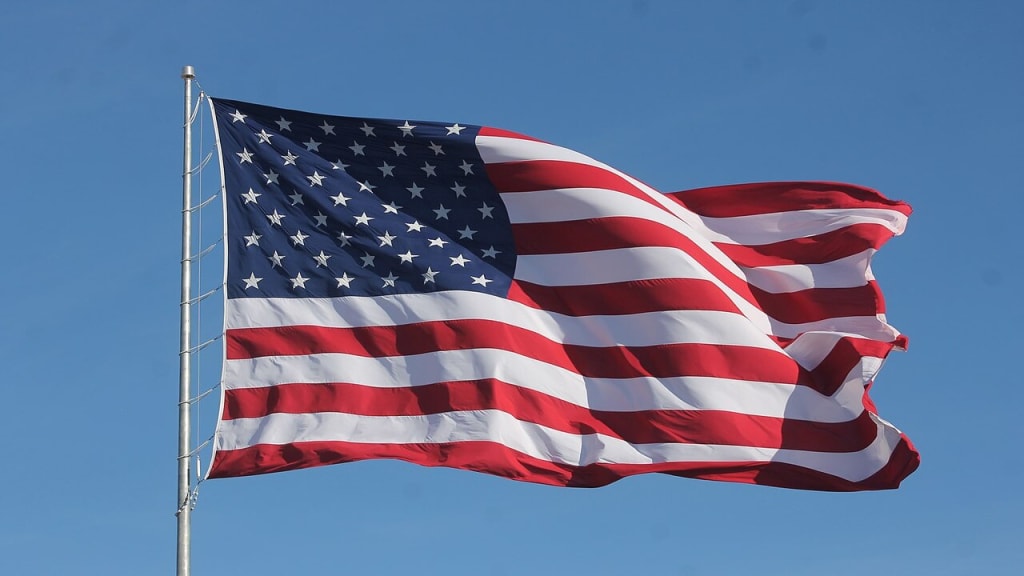Content warning
This story may contain sensitive material or discuss topics that some readers may find distressing. Reader discretion is advised. The views and opinions expressed in this story are those of the author and do not necessarily reflect the official policy or position of Vocal.
A Fascinating Journey
The History of the United States of America

A Fascinating Journey Through the History of the United States of America
The history of the United States of America is an enthralling tapestry woven with triumphs, struggles, and profound changes that have shaped the nation into what it is today. From the early colonization by European settlers to the rise of a global superpower, the United States has witnessed extraordinary events and undergone remarkable transformations. Join us on a fascinating exploration of key moments that define the rich history of the United States.
1. The American Revolution (1775-1783) - Igniting the Flame of Independence
: The American Revolution stands as a remarkable turning point in history, marking the birth of a new nation. Frustrated with British rule and longing for freedom, thirteen American colonies rebelled against the crown. In 1776, the signing of the Declaration of Independence not only declared their separation but also laid the groundwork for the formation of the United States. This momentous event ignited the ideals of freedom, democracy, and individual rights, which have since become the cornerstone of the nation's identity. The American Revolution set in motion a series of struggles for civil rights and equality that would shape the nation's path in the centuries to come.
2. Westward Expansion (1803-1890) - The Uncharted Frontier:
The concept of Manifest Destiny, popularized in the 19th century, propelled the westward expansion of the United States. From the Louisiana Purchase in 1803 to the California Gold Rush in 1849, pioneers and settlers ventured into unexplored territories, seeking new opportunities and a better life. This era witnessed the establishment of new states, the clash with Native American tribes, and the rapid growth of the railroad industry, which facilitated the movement of people, goods, and ideas across the vast expanse of the continent. The drive for land acquisition and the belief in the nation's divine mission significantly shaped the nation's identity, while also raising questions about the treatment of indigenous peoples and the environmental impact of this expansion.
3. Civil War and Emancipation (1861-1865) - Divisions and a Struggle for Freedom:
The American Civil War stands as one of the most defining moments in United States history. Fueled by tensions over slavery, state rights, and federal authority, the Northern and Southern states clashed in a bitter conflict. The war not only tested the nation's unity but also brought the issue of slavery to the forefront. With the Emancipation Proclamation in 1863, President Abraham Lincoln declared the freedom of enslaved people, shifting the focus of the war towards the abolitionist cause. The conflict resulted in the preservation of the Union and the eventual abolition of slavery, but it also left scars that took years to heal. The Civil War forever changed the social, economic, and political landscape of the United States, shaping the nation's path towards equality and justice.
4. Industrialization and the Gilded Age (late 19th century) - The Rise of an Industrial Powerhouse:
The late 19th century witnessed a rapid transformation as the United States experienced an unprecedented era of industrialization. Innovations such as the assembly line, steel production, and the rise of industrial tycoons propelled the nation's economy forward. This period, often referred to as the Gilded Age, saw the accumulation of wealth and technological advancements, but it also highlighted vast income disparities and labor exploitation. While captains of industry, such as Andrew Carnegie and John D. Rockefeller, amassed immense fortunes, many workers faced harsh conditions and long hours. The disparities in wealth and the social unrest that followed led to calls for reform, ultimately shaping the future trajectory of labor rights and social justice movements in the United States.
5. World War II and the Emergence as a Superpower (1939-1945) A Global Conflict and a Shifting Balance of Power:
World War II catapulted the United States onto the world stage, marking a defining moment in its history. The surprise attack on Pearl Harbor in 1941 propelled the nation into a global conflict, where it played a crucial role in defeating Nazi Germany and Imperial Japan. The United States emerged as a superpower, reshaping the balance of global power and influencing international affairs. The war's aftermath led to significant geopolitical changes, including the division of Europe during the Cold War. The United States became a leader in diplomacy, economics, and military capabilities, laying the foundation for its continued dominance on the world stage.
6. Civil Rights Movement (1950s-1960s) - A Struggle for Equality and Justice:
The mid-20th century witnessed a profound struggle for civil rights and equality in the United States. Led by influential figures such as Martin Luther King Jr., Rosa Parks, and Malcolm X, the Civil Rights Movement fought against racial segregation, discrimination, and the denial of voting rights. Through nonviolent protests, grassroots activism, and landmark legal battles, the movement pushed for lasting change. The Civil Rights Act of 1964 and the Voting Rights Act of 1965 were crucial legislative victories that dismantled legal segregation and ensured equal voting rights for all citizens. The Civil Rights Movement sparked a nationwide conversation about racial equality, leaving an indelible mark on American society and inspiring future generations to continue the pursuit of justice.
7. Technological Revolution and the Digital Age (late 20th century) - Shaping the Future):
The late 20th century witnessed a technological revolution that transformed the world, with the United States at its forefront. Breakthroughs in computing, telecommunications, and the internet brought about unprecedented advancements. Personal computers, mobile phones, and the birth of the World Wide Web revolutionized communication, commerce, and entertainment. The United States played a pivotal role in driving these technological developments, with regions like Silicon Valley becoming global hubs of innovation. This era marked a shift towards a knowledge-based economy, transforming various industries and influencing the way people connect and interact. The digital age opened up new possibilities for global connectivity, entrepreneurship, and cultural exchange, reshaping the way we live, work, and communicate.
Conclusion
The history of the United States of America is a captivating narrative filled with triumphs, struggles, and immense transformations. From its birth in the fires of the American Revolution to becoming a global superpower, the United States has navigated countless challenges and shaped its identity through significant historical events. By understanding and appreciating these key moments, we gain valuable insights into the nation's complex journey and the indomitable spirit of its people. The history of the United States continues to evolve, driven by the aspirations, struggles, and aspirations of its citizens, serving as a reminder that the pursuit of freedom, equality, and progress is a perpetual endeavor.
About the Creator
imran khalil
In a world where words shape our perceptions, ignite our imaginations, and connect us across time and space, article writers play a crucial role in delivering informative and engaging content. Among these skilled communicators,
Enjoyed the story? Support the Creator.
Subscribe for free to receive all their stories in your feed. You could also pledge your support or give them a one-off tip, letting them know you appreciate their work.





Comments
There are no comments for this story
Be the first to respond and start the conversation.